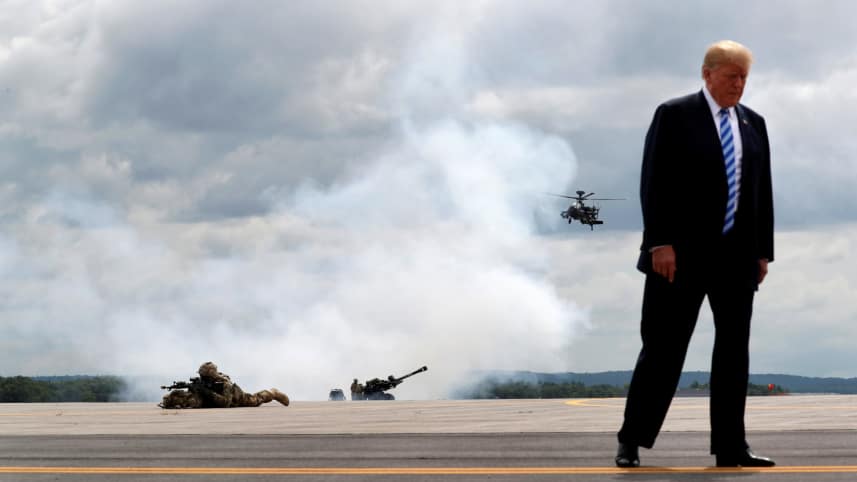Analysis/Syria Pullout: Israel Left With False Russian Promises and a Volatile U.S. President
تحليل سياسي من الهآرتس بقلم عاموس هاريل: الإنسحاب الأميركي من سوريا يضع إسرائيل بمواجهة وعود روسية كاذبة ورئيس أميركي متقلب
Amos Harel/Haaretz/December 21/18
Trump pulls rug from under his own generals ■ An Israeli expert on Russia lays out Putin’s strategic reasoning in Syria.
With the thrust of the sword, or really with strike of just one tweet, U.S. President Donald Trump ruined all the plans of his advisers and generals.
For many months, all of them have been explaining – from Secretary of Defense James Mattis, who announced his resignation Thursday, to National Security Adviser (Trump’s third in less than two years) John Bolton – to Trump how important the American presence in Syria is to blocking Iranian expansion, containing Russian influence in the Middle East and bolstering the international standing of the United States.
On Wednesday, along came Trump and pulled the rug out from under their feet. Diplomats and other U.S. government employees will leave Syria within 24 hours, and the last American soldier will leave in 100 days.
Who is the wise man who can understand what led to Trump’s decision? Was it something he saw on television, on the Fox network where he spends so much of his time? Maybe he wanted to quickly divert the media debate to another topic, after another catastrophic week in which it seemed the noose that special prosecutor Robert Mueller is readying around him is growing even tighter? Or maybe he just remembered his campaign promise to make America great again by reducing its spending on wars far from its shores?
As far as Israel is concerned, this story has one immediate lesson and one long-term conclusion. The immediate conclusion is that the desire to distance Iranian forces and the Shi’ite militias from Syria is nowhere near being realized.
Russia sold Israel barren promises, which crumbled after six months or so – and the United States is not excited about helping out. And even if the Israel Defense Forces racked up an impressive achievement in the series of confrontations with the Iranian Revolutionary Guards in Syria last spring, this does not mean that Tehran has given up on its plans.
The long-term lesson is that Trump, in his situation, has become someone who cannot be relied on. Even if he is basically sympathetic to Israel, and even though he is surrounded by family, advisers and weathly people who are Jewish, Trump is in such big trouble and acts in such an erratic manner that the Israeli government cannot be certain of his support over the long term.
The chances that the American administration will advance a coherent “Deal of the Century” peace plan with the Palestinians now seems to be minimal, similar to the possibility that Trump will suddenly reconcile with the Iranians, in the same way he fell in love with the North Korean dictator – and in the same breath he announced, without any foundation, the end of Pyongyang’s nuclear threat. But it is simply impossible to know when it comes to Trump – and the decision makers in Jerusalem need to take into account the increased sphere of uncertainty in which they are operating.
The Kurds have the real right to complain
The Israeli disappointment is just another relatively small matter compared to the betrayal that the Kurds certainly feel, after they sacrificed thousands of their fighters to aid the American campaign against the Islamic State, and will now remain without any military support to fall back on in Syria.
In comparison, the U.S. retreat from Syria has been received with satisfaction in the broad camp that supported the Bashar Assad regime in the Syrian civil war, led by Russia and Iran. Russian President Vladimir Putin can, for now, consider his Syrian adventure to be an impressive success.
Assessments heard in the Israeli defense establishment, to the effect that Russia would sink deep into the mire in Syria, a sort of Russian Vietnam (or another Afghanistan for Moscow), were proven wrong. Putin’s decision in September 2015 to send two squadrons of Russian combat planes to help out Syrian President Bashar Assad has paid off. It tipped the balance in the civil war in favor of the regime, which at the time was on the verge of collapse, and later it shored up Moscow’s international standing.
Prof. Dmitry Adamsky, from the School of Government, Diplomacy and Strategy at the Interdisciplinary Center in Herzliya, is one of the outstanding analysts of Russian strategy. In a policy paper, “Moscow’s Syria Campaign: Russian Lessons for the Art of Strategy,” published recently by independent French think tank IFRI, Adamsky describes the deep influence of Russian military involvement in Syria on “Russian strategic thought and operational art.”
Moscow entered the campaign in Syria for a combination of reasons: Defending its ally (Assad); preserving its assets (most important of them, maintaining control of the port of Tartus on the Mediterranean Sea); striking the Islamic jihadists, some of whom came from its neighboring countries in Central Asia; attempting to improve its international and regional position; and diverting attention from its moves in Crimea and in eastern Ukraine.
Adamsky identifies three Russian strategic principles that were played out in Syria. The first principle is preserving friction at a high, but controlled level, which allows Moscow to strengthen its status as a broker in its contact with all the parties, all of whom need the Russians. Russia was part of the problem in Syria, but is also part of the solution. The contacts it kept with all the sides gave it an advantage in its competition with the Americans. In every conflict, Russia will work to underscore the limits power of each of the parties and their dependence on the Kremlin, writes Adamsky.
It should be noted that these are the principles implemented in Russia’s contacts with Israel, too: First establishing a hot line to prevent aerial confrontations between planes from both countries, and later – recently – the cold shoulder Prime Minister Benjamin Netanyahu received from Putin after the Ilyushin spy plane was shot down by Syrian antiaircraft fire.
The second principle, according to Adamsky, is the avoidance of what the Russians view as the greatest danger, the uncontrolled expansion of the campaign – what the Americans call “mission creep,” a mission that gradually exceeds its original scope. The third principle is preserving strategic flexibility, while remaining aware of the limits of their power and while implementing rapid adaptations when they are necessary.
Putin has reasons to be satisfied by Russia’s strategy, says Adamsky. It is not just the fact that Russia succeeded in stabilizing the Assad regime, but also that the cost of the war, in both casualties and money, was reasonable as far as the Russians were concerned. Their regional and international status was bolstered, military officers gained operational experience and the troops managed a complex campaign filled with intelligence and technology, in which Russia tested the validity of new combat doctrines and displayed its military capabilities and its modern weapons systems, for all to see in the international arena.



















